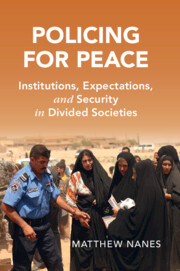Book contents
- Frontmatter
- Contents
- List of Figures
- List of Tables
- Preface
- Acknowledgments
- 1 Introduction: The Challenge of Institution-Building in Divided Societies
- 2 Power Sharing, Policing, and Peace
- 3 Sectarianism and Conflict in the Iraqi Police
- 4 Identity and Inclusion in the Israeli Police
- 5 Perceptions
- 6 Police Integration and Anti-Government Violence
- 7 Citizen Cooperation and Crime
- 8 Barriers to Integration
- 9 Conclusion: Peace-Building through Institutional Inclusion
- Appendix A Data and Methods
- Bibliography
- Index
- Seriespage
9 - Conclusion: Peace-Building through Institutional Inclusion
Published online by Cambridge University Press: 12 November 2021
- Frontmatter
- Contents
- List of Figures
- List of Tables
- Preface
- Acknowledgments
- 1 Introduction: The Challenge of Institution-Building in Divided Societies
- 2 Power Sharing, Policing, and Peace
- 3 Sectarianism and Conflict in the Iraqi Police
- 4 Identity and Inclusion in the Israeli Police
- 5 Perceptions
- 6 Police Integration and Anti-Government Violence
- 7 Citizen Cooperation and Crime
- 8 Barriers to Integration
- 9 Conclusion: Peace-Building through Institutional Inclusion
- Appendix A Data and Methods
- Bibliography
- Index
- Seriespage
Summary
This chapter highlights key findings and proposes a path forward for the implementation of police integration in power sharing and post-conflict agreements. I identify several key lessons of police integration. In particular, it has the potential to provide societywide net benefits, making it a promising first step toward reconciliation where intergroup trust is especially low. When it comes to implementation, police integration is applicable to an unusually wide range of settings because unlike legislatures and cabinets, the police are no less effective in autocracies compared to democracies. I close by proposing a potential extension of my argument: Integration of other service-providing bureaucracies such as public education or healthcare may have similarly positive impacts on citizen–state relations by helping the government credibly signal its intentions to historically marginalized citizens.
- Type
- Chapter
- Information
- Policing for PeaceInstitutions, Expectations, and Security in Divided Societies, pp. 180 - 200Publisher: Cambridge University PressPrint publication year: 2021

